Have you ever found yourself lying in bed, unable to sleep, only to be serenaded by the sweet melodies of birds chirping outside your window in the dead of night? It’s a perplexing phenomenon that has left many of us curious – why are birds chirping at night?
While we may be accustomed to associating these sounds with the break of dawn, there are a few fascinating reasons that might explain why our feathered friends choose to sing under the cover of darkness.
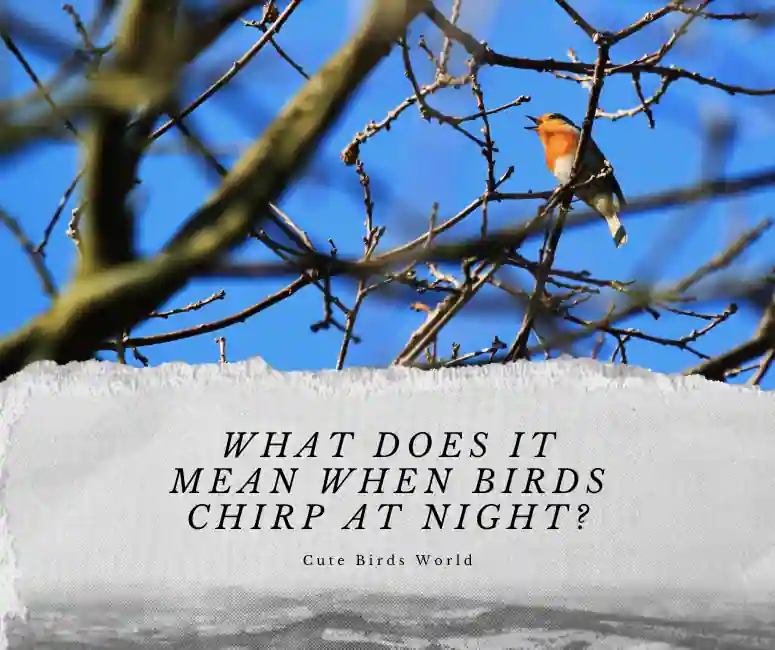
Why Are Birds Chirping At Night
Birds chirping at night may seem like an unusual phenomenon, especially since we often associate their cheerful melodies with the break of dawn. However, there are several reasons why birds engage in this behavior during the nighttime hours.
In this article, we will explore the various factors that contribute to birds chirping at night, including their nocturnal behavior, the influence of artificial light and urbanization, hormonal changes during the breeding season, environmental factors, predation and alarm calls, artificial chirping, and other factors.
By understanding the biological significance of nighttime chirping, we can gain a deeper appreciation for these fascinating creatures and their contributions to the natural world.
The Nocturnal Behavior of Birds
Adaptation to Low Light Conditions
Birds, being highly adaptable creatures, have developed unique strategies to thrive in low-light conditions. While most birds are diurnal, meaning they are active during the day, some species have evolved to be predominantly nocturnal. These nocturnal birds possess exceptional vision that allows them to navigate and hunt in the darkness.
By chirping at night, these birds communicate with each other and establish their presence within their nocturnal habitats.
Foraging Opportunities
Foraging is a crucial activity for birds to obtain food and sustain their energy levels. Nocturnal birds take advantage of the reduced competition for resources during the nighttime hours, as many diurnal species are inactive.
By chirping at night, these birds signal their intentions to feed and communicate with others in their species, facilitating successful foraging expeditions.
Mating Calls and Communication
Birds are known for their elaborate courtship rituals and vocalizations during the breeding season. Chirping at night serves as a means of communication between potential mates.
Male birds often use their melodic songs to attract females, proclaiming their presence and fitness as desirable partners. These calls can also serve to establish territories, ensuring that other males do not encroach upon their chosen breeding grounds.
Artificial Light and Urbanization
Disruption of Circadian Rhythm
The spread of artificial light in urban areas has significant implications for the behavior of birds. Like other living organisms, birds have an internal circadian rhythm that regulates their sleep-wake cycle.
The presence of artificial light at night can disrupt this natural rhythm, causing birds to chirp during what would typically be their resting hours. This disruption can have adverse effects on their health and overall well-being.
Extended Foraging Hours
Artificial light also extends the foraging hours for both diurnal and nocturnal species. Birds that would typically rest or sleep during the nighttime hours are enticed to continue foraging due to the illumination provided by streetlights and other sources of artificial light.
This extended availability of food resources can contribute to an increase in bird activity, including chirping, during the night.
Impact on Bird Behavior
The encroachment of urbanization on natural habitats can significantly affect bird behavior. Bright city lights can attract nocturnal birds, leading them to chirp and forage in areas unsuitable for their survival.
Additionally, the excessive noise pollution in urban environments can mask or interfere with bird vocalizations, forcing them to adjust their behavioral patterns and vocalize at alternative times, such as at night.
Breeding Season and Hormonal Changes
Seasonal Variation in Chirping
During the breeding season, birds undergo hormonal changes that influence their behavior, including their vocalization patterns. As the days lengthen and temperatures rise, male birds produce increased levels of testosterone, which prompts them to sing more frequently and intensely. This hormonal surge may contribute to nighttime chirping as male birds compete for attention and seek potential mates.
Importance of Territorial Calls
Territory establishment is crucial during the breeding season, as male birds strive to attract females and defend their chosen territories from rival males. By chirping at night, male birds assert their presence and mark their territories, warning other males to stay away.
These territorial calls function as a form of advertisement and communication among individuals of the same species.
Attracting Mates
Chirping at night can also be a means for male birds to attract potential mates. By singing their species-specific songs during the night, male birds display their vitality, genetic quality, and overall fitness to females.
The complexity and quality of these songs can indicate the male’s ability to provide resources and raise offspring, making them more attractive to females seeking desirable partners for successful reproduction.
Environmental Factors
Temperature and Climate
Birds are highly attuned to changes in their environment, including fluctuations in temperature and weather patterns. Some species of birds, such as certain nightjars and owls, are more vocal during warmer nights, as higher temperatures can promote increased insect activity.
The abundance of insects provides a readily available food source, encouraging birds to chirp as they forage for sustenance.
Indicators of Environmental Changes
Birds, with their sensitivity to environmental changes, can act as valuable indicators of shifts in ecosystems. Chirping at night can serve as a behavioral response to environmental alterations, such as changes in vegetation, prey availability, or natural disturbances.
By studying these vocalizations, researchers can gain insights into the health of ecosystems and potential impacts on bird populations.
Species-specific Adaptations
Different bird species have evolved unique adaptations to their specific environments. Some birds chirp at night as a survival strategy to avoid predators that are more active during the day.
By being active and vocalizing at night, these birds reduce their risk of predation and increase their chances of survival. These adaptations highlight the remarkable diversity and resourcefulness of birds in adapting to their surroundings.
Predation and Alarm Calls at Night
Strategies to Avoid Predators
Nocturnal birds often face threats from predators lurking in the darkness. To counter these dangers, birds employ various strategies to avoid predation.
Chirping at night can serve as a form of vigilance, allowing birds to stay in contact with their flock members and alert each other to potential threats. By communicating through vocalizations, birds can synchronize their movements and increase their collective safety.
Alarm Calls as a Warning System
Alarm calls play a crucial role in bird communication and defense against predators. When a bird spots a potential threat, such as a predator approaching, it will emit an alarm call to warn others nearby.
These vocalizations serve as an effective early warning system, enabling other birds to take evasive action and protect themselves from imminent danger.
Chirping at night can include alarm calls, signaling the presence of predators and promoting collective vigilance within a bird community.
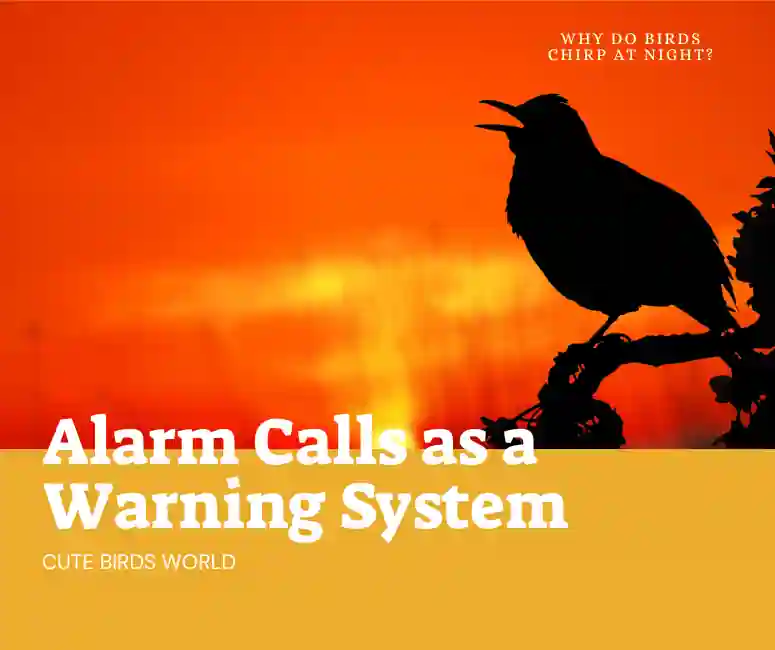
Artificial Chirping at Night
Captive Birds and Light Exposure
Some captive birds may exhibit increased nighttime vocalization due to their exposure to artificial light. Birds kept as pets or in aviaries may experience disrupted circadian rhythms as a result of prolonged exposure to artificial light sources, leading to altered behavioral patterns, including chirping at night.
This artificial chirping may be a consequence of their internal clocks being influenced by the extended illumination, causing them to vocalize beyond their natural rhythm.
Recordings and Playback
Recordings and playback of bird vocalizations can also contribute to the phenomenon of artificial chirping at night. With digital technology readily available, individuals can play pre-recorded bird songs during the nighttime hours, attracting birds to specific areas.
The presence of these unfamiliar songs may confuse or intrigue birds, prompting them to vocalize in response. While this practice may provide a unique opportunity for birdwatching, it is essential to consider the potential impacts on bird behavior and ecological dynamics.
Excessive Chirping and Other Factors
Competition and Territory Disputes
Chirping at night can also arise due to competition and territorial disputes between birds. In densely populated bird communities, individuals may engage in vocal battles to establish dominance and defend their territories.
This heightened vocal activity can result in increased nighttime chirping as birds vie for valuable resources and mating opportunities.
Noise Pollution and Urban Soundscapes
Urban environments are notorious for their high levels of noise pollution, which can have significant effects on bird populations. Excessive noise from human activities, such as traffic, construction, and industrial machinery, can interfere with bird vocalizations and disrupt their natural communication patterns.
Birds may respond to this noise pollution by adjusting their chipping behaviors, including singing at night when the surrounding noise levels are relatively lower.
Disease and Stress
Medical conditions and stress can also contribute to increased nighttime chirping in birds. Certain illnesses or injuries may lead to discomfort or distress, causing birds to vocalize more frequently, including during the night.
Additionally, environmental stressors, such as habitat loss or pollution, can impact bird populations, potentially altering their behavioral patterns and increasing nighttime vocalizations.
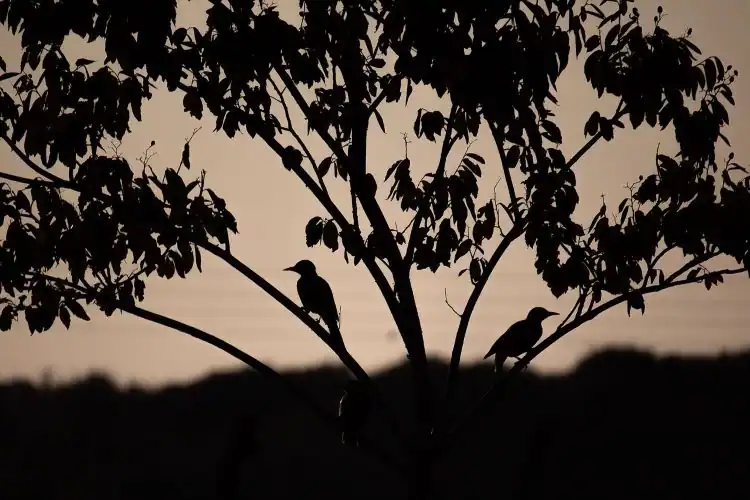
Understanding the Biological Significance
Study of Bird Behavior and Ecology
The study of bird behavior and ecology, including their vocalizations, provides valuable insights into their biology and the dynamics of ecosystems.
Nighttime chirping offers researchers an opportunity to better understand the factors that influence bird behavior, their responses to changing environments, and the ways in which they communicate with each other.
Conservation Implications
Bird populations worldwide face numerous threats, from habitat destruction to climate change. By studying their nighttime vocalizations, scientists can develop a more comprehensive understanding of the impacts of these threats on bird behavior.
This knowledge can inform conservation efforts and assist in the development of strategies to mitigate and manage the challenges faced by birds in rapidly changing environments.
Role in Ecosystems
Birds play crucial roles in maintaining healthy ecosystems. They contribute to seed dispersal, pollination, insect control, and nutrient cycling, among other ecosystem services. By chirping at night, birds fulfill their ecological functions, ensuring the continuity and stability of their respective habitats.
Understanding the biological significance of nighttime chirping highlights the interconnectedness of species within ecosystems and emphasizes the importance of protecting their populations.
Some Birds That Chirp at Night
1. Hermit Thrush
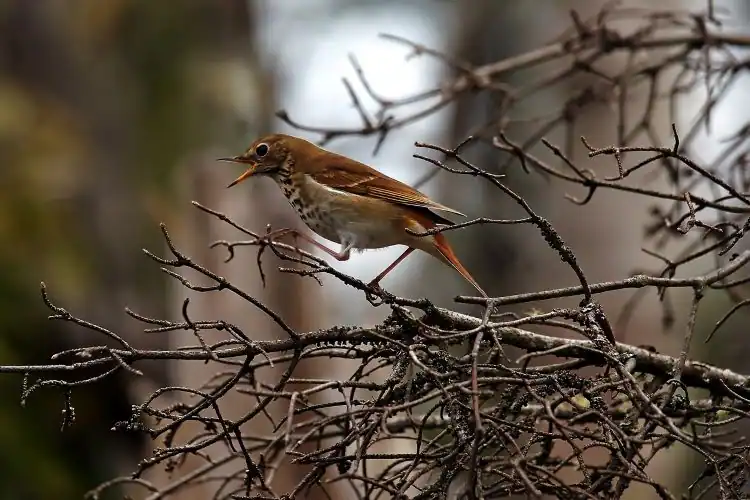
2. Common Nightingale
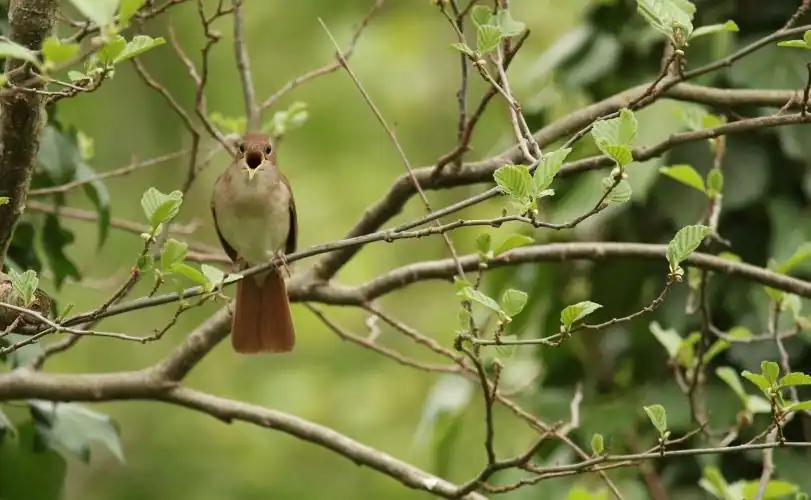
3. American Robin

4. Yellow-breasted Chat
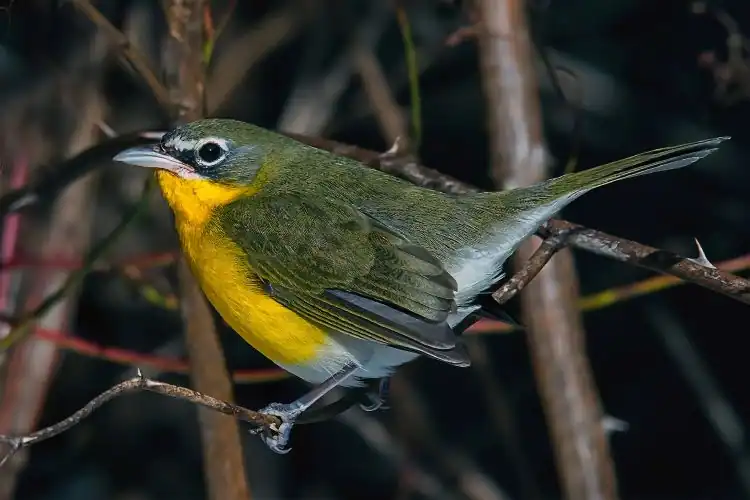
5. Barn Owl
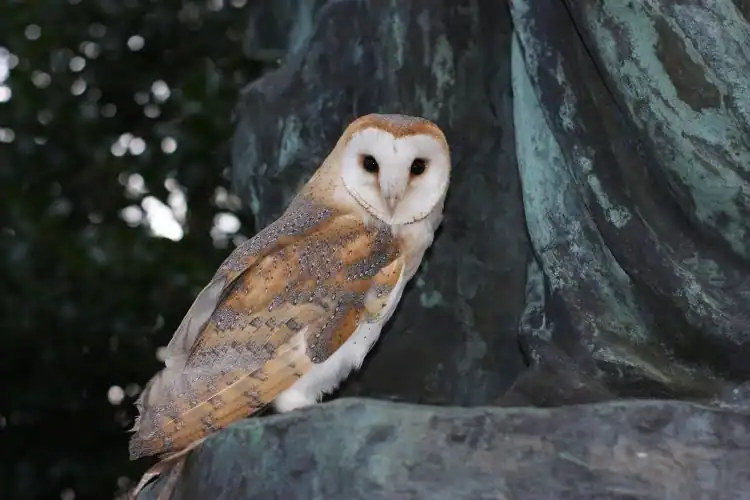
6. Barred Owl
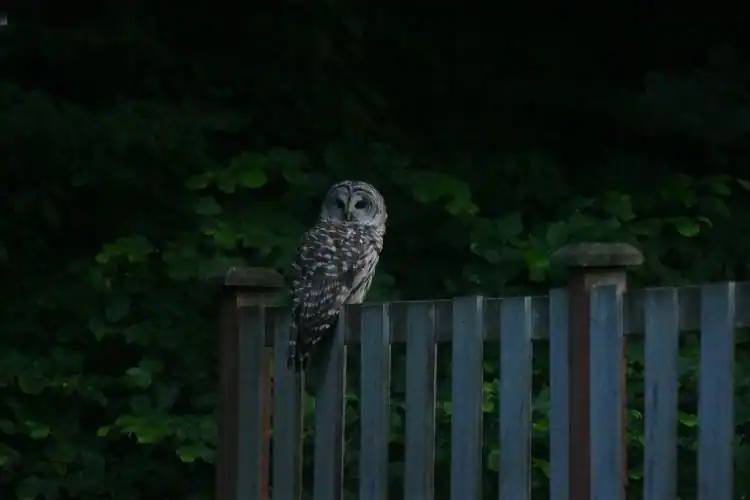
7. Northern Mockingbird

8. Common Blackbird
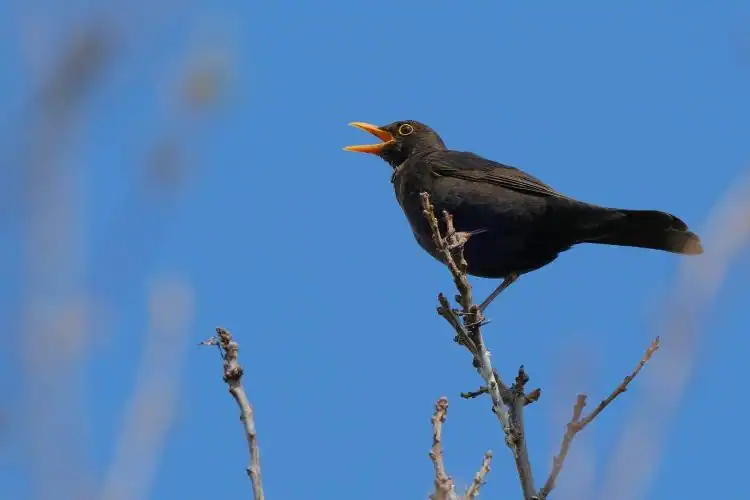
Conclusion
Birds chirping at night is a complex behavior influenced by a variety of factors, including their nocturnal behavior, artificial light and urbanization, hormonal changes during the breeding season, environmental factors, predation and alarm calls, artificial chirping, and other ecological and biological factors.
By exploring and understanding these influences, we can gain a deeper appreciation for the fascinating world of birds and their significance in maintaining the balance of our ecosystems.
Whether you find solace in their nighttime serenades or marvel at their adaptations, the birds’ songs offer a glimpse into their lives and the interconnected web of life that we all share.


